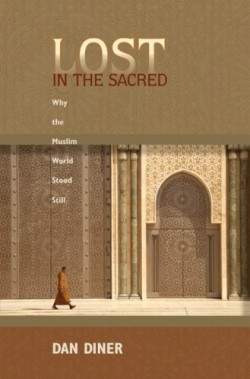Lost in the Sacred
Why the Muslim World Stood Still
When the first Arab Human Development Report (AHDR) was issued in 2002 it caused much soul searching. The report a project of the United Nations was compiled by Arab intellectuals sociologists and economists. Its unflinching assessment of the three benchmarks for development—knowledge freedom and women’s empowerment—showed that there were endemic problems. Poor technological and scientific development poor educational levels non-existent or weak political institutions (unions and professional organizations) overbearing governments and the exclusion of women from the economic and political spheres were all widespread in Arab nations.
Diner a professor of modern history at the Hebrew University of Jerusalem and the director of the Simon Dubnow Institute for Jewish History and Culture at the University Leipzig Germany analyzes how the Middle East which led in cultural mathematical and scientific innovation during Europe’s Dark Ages lost momentum. His books include Beyond the Conceivable: Studies on Germany Nazism and the Holocaust; Cataclysms: A History of the Twentieth Century from Europe’s Edge; and America in the Eyes of the Germans: An Essay on Anti-Americanism.
Following World War I the Ottoman Empire was divided by the European victors. The Republic of Turkey was formed and its secular government abolished the offices of the caliphate. The caliph was seen as the successor to the prophet Muhammad and was the political leader of the Islamic world. Turkey’s decision still influences Muslims worldwide and is considered by some to be an abomination.
Diner believes that the preference for oral transmission of the Koran and the difficulty in learning high Arabic (as opposed to spoken Arabic) meant that the Arab world was slow to embrace the printing press. According to Diner “Islamic purists saw these modern machines as work of the devil challenging God’s control over time. They challenged both belief and believers. Such speeding up of the world’s pace could only end badly.” That led to a sharp partitioning of knowledge between the educated and the uneducated. He asserts that the interpretation of the Koran as the perfect word of God with nothing missing nor extra and the desire of some pious Muslims to achieve perfection by living as the prophet Muhammad did in sixth and seventh centuries means that people must always look to history for answers.
Diner’s book is a deep and thorough analysis of the causes of the problems identified by the AHDR that will be of interest to followers of Middle Eastern history and politics and those looking to under-stand the differences with the West.
Reviewed by
Deirdre Sinnott
Disclosure: This article is not an endorsement, but a review. The publisher of this book provided free copies of the book to have their book reviewed by a professional reviewer. No fee was paid by the publisher for this review. Foreword Reviews only recommends books that we love. Foreword Magazine, Inc. is disclosing this in accordance with the Federal Trade Commission’s 16 CFR, Part 255.

